Mary Anne Yarde's Blog: The Coffee Pot Book Club , page 124
September 3, 2019
Join #HistoricalFiction author, Johanna Craven, as she takes a look at Life in the Time of the Cornish Smugglers #History #Cornwall Johanna Craven @JohannaCraven
Life in the Time of the Cornish SmugglersBy Johanna Craven
It is just past midnight. A sliver of a moon reflects off the sea. There is just enough light to show you the way.
It is 1750, and you are waiting on the cliffs of a tiny fishing village in Cornwall, on England’s southwest tip. Though smuggling is rife throughout the country, owing to exorbitant taxes on imported liquor, nowhere is ‘free trade’ more flourishing than among Cornwall’s maze of coves, caves and near-inaccessible beaches. A member of the smuggling syndicate’s landing party, you have been tasked with the job of carrying the spout lantern; a lamp specially made by local craftsmen that allows you to shine a beam of light out to sea, without it being seen from the land. The smuggling vessel is due to return at any moment, having made its latest run to Saint Peter Port, in Guernsey, where un-taxed French liquor is sold by the gallon. The ship’s captain will be watching the cliffs, waiting to see your light.

Like all free trading gangs, your syndicate has its own language when it comes to communicating via lantern-light. A steady beam tells the captain it is safe to land. A flash tells alerts him of the presence of the revenue men.
A blue flare rises suddenly from the water. The smuggling vessel is in the bay. One of the crew has fired an unloaded pistol to tell the landing party they have arrived. You can just make out the inky shape of the ship on the water.
You wait. Listen. Watch. There is no sound of riding officers on the nearby roads. No customs cutter prowling the bay. And so you light the spout lantern and send an unbroken beam of light out to the waiting ship. It is safe to land.
With the lantern still in hand in case the revenue men should appear, you make your way down onto the beach with the rest of the landing party; a group of farmers and miners, eager for a cut of the sizeable proceeds the smuggling haul will garner.
In the faint light, you can see the boats gliding towards the shore, loaded with crates and ankers small enough for a man to carry slung over his shoulders. In the past, when the riding officers have shown themselves, the captain has been forced to send the contraband to the bottom of the bay, tied to a marker barrel for collection the following night.
But tonight the landing is smooth. No one is watching. The landing party begins its weary trudge up the steep hill from the beach. Some men are on horseback, others carry goods by foot. The contraband will be hidden throughout the village; in barns and tavern cellars, in the empty well by the village green.
Tomorrow, the goods will be distributed. There are shipments of liquor to go to local taverns. Tobacco for the local magistrate, new lace gloves for the earl’s wife. Children will fill their pockets and scurry up the lanes. Women will carry ankers beneath their skirts, pretending to be heavy with child. And undertakers will load their hearses with contraband, taking their liquor-laden carts right beneath the revenue men’s eyes.

The first hint of dawn is lightening the sky when the last of the ankers are hidden away. In a few hours, you are due to start work at the tin mine. But there is just enough time for a celebratory drink. You trudge upstairs from the tavern cellar with the rest of the landing party. A few of the other villagers have come to meet you. In these parts, there is a decency to smuggling. It is seen as a trade that gives power back to the people. The noblest of trades. And so it is with a sense of pride that you sink exhausted in a chair and toss back a glass of French brandy, watching out the window as a new day arrives.
The West Country Trilogy
By Johanna Craven

Bridles Lane
Cornwall, England. 1740.
They say only the brave ride Bridles Lane at night.
Vicar Richard Dodge speaks of ghosts and demons, conducting elaborate exorcisms in his churchyard overlooking the lane. And with the villagers sheltering in fear, local smugglers carry their haul up the road to be hidden in the safety of the church.
Isaac and Scarlett Bailey have spent their lives hiding contraband in Talland church. Forced into free trade by their father's mistakes, they want nothing more than to escape the smuggling syndicate and build a life above the law.
When a seemingly abandoned ship is wrecked in Talland Bay, it sparks a wave of hysteria among the superstitious villagers. Among growing unrest, the mystery of the wrecked ship deepens, unearthing long-forgotten secrets that will tear a village- and a family- apart.
Hills of Silver
Scarlett Bailey has left home with a knife in her hand, to search for the father she has grown up believing dead. Determined to punish him for abandoning his family, Scarlett finds herself drawn into the world of a local press gang, where smugglers rub shoulders with naval officers and the revenue men are full of surprises.
Scarlett's brother, Isaac, is making his own plans to escape Talland and release his family from a life of free trade. Behind the back of syndicate boss, Charles Reuben, he conducts dangerous smuggling runs that will see a bullet in his chest if he is caught.
When the truth of their father's disappearance finally comes to light, it will have far-reaching implications for Scarlett and Isaac. And while they both fight the allure of dangerous love, their enemies will do anything to stop their escape from succeeding.
Wild Light
Isaac and Scarlett Bailey’s attempts to escape the smuggling syndicate have left their lives in pieces. Isaac’s children are missing, and Scarlett’s battle with the darkness inside her has just become far more difficult.
As the search for the children escalates, long-buried truths begin to surface, blurring the line between myth and reality, enemy and friend. Home is no longer safe and risks must be taken.
Their only option is to escape— no matter what the cost.
Pick up your copy of
The West Country Trilogy
Amazon
Johanna Craven
 Johanna Craven is an historical fiction writer, pianist and film composer. She has lived on three continents and currently divides her time between London and Melbourne. She loves ghost-hunting, cooking (and eating) and plays the Celtic fiddle very badly.
Johanna Craven is an historical fiction writer, pianist and film composer. She has lived on three continents and currently divides her time between London and Melbourne. She loves ghost-hunting, cooking (and eating) and plays the Celtic fiddle very badly. Johanna released her first novel Music from Standing Waves in 2015 before signing with Endeavour Media for her second novel The Devil and the Deep Blue Sea. Her most recent project, the West Country Trilogy is inspired by true events from 18th century Cornwall and is available now.
Connect with Johanna: Website• Facebook• Goodreads.
Published on September 03, 2019 20:00
September 2, 2019
A cautionary tale…osmosis isn’t always the ‘serie-s’ way to go! by Nancy Jardine #amwriting #HistoricalFiction #tips @nansjar
Published on September 02, 2019 20:00
September 1, 2019
Join #HistoricalFiction author, Paula Lofting, as she takes a look back in time to 1066 and the promise that never was #History #1066 @Paulalofting
The Promise That Never Was
By Paula Lofting
September 1066 and Harold, King of England has been in the job for only 9 months. In that time, he has known little peace. William, Duke of Normandy had been preparing for some months to invade from across the channel after getting it into his head that somehow he had a right to the English throne. Harold’s brothers-in-law, Edwin and Morcar, were about to fight the king’s own brother, Tostig, who had been exiled from his earldom in Northumbria after ten years’ service. Tostig was out for revenge, blaming Harold for his downfall - and he’d brought Harald Hardrada with him just for good measure. Hardrada was, as his name suggests, a hard man, and king of Norway, looking to expand his empire. Harold, having heard of Tostig’s landing on the Northeast coast was getting ready to march north to come to the aid of his young brothers-in-law. It had been a tough time.

Harold had been elected king by the witan, which was how they did things in Anglo-Saxon England, directly after, or perhaps before, the demise of Edward the Confessor. It was a choice of either the experienced, powerful Earl of Wessex, or the fourteen-year-old boy Edgar, an atheling of royal blood, who was about as powerful as a fish out of water, with little following other than his own household perhaps. So just what was a kingdom to do? They elected the man who had the power to protect England the best.This was going to shake things up a bit over in Normandy, and rightly so, after all William had waited fifteen years for his cousin to up and die and leave his throne to him and what does that pesky son of Godwin do? He steals it right out from under him! The fact that Harold had sworn an oath to William on a casket of holy relics, surely meant something. After all, this Harold had done willingly whilst on a trip in 1064 to the Norman court. Duke William’s cousin, King Edward, had specifically sent his dux Anglorum, Harold Godwinson, to confirm a promise made to William in 1051 that Edward would consider him his heir should he not be brought to fatherhood by his wife, Edith. And as the years went by, it became obvious that no such heir was going to materialise before Edward’s demise.

But why would a supposedly intelligent chap like Harold, swear fealty to the Norman duke having been sent by King Edward to purposely confer the promise of his throne to him, and then once home conspire to take the throne himself? Seems like asking for trouble if you ask me… but, there is another story, which admittedly did not come to light till some years later, which can also be seen within the threads of the Bayeux Tapestry. The story in brief is that Harold was not sent to Normandy by King Edward but rather, he took himself off to Normandy, against the advice of the king that nothing good would come of it, to negotiate the release of his brother Wulfnoth and nephew Hakon. What?! I hear you exclaim. How can this be so? This is not the story we have been led to believe!Most of the early contemporary sources are of Norman origin and speak of Harold’s visit to Normandy, suggesting that Edward sent Harold to confirm Edward’s intention of making him king of England on his death. This was said to have occurred somewhere between the autumn of 1064 and Summer of 1065. We know that Harold was definitely in England in the late Summer of 1065 and considering what was happening at that time I would plump for his travel to Normandy in the autumn of 1064. It is strange that the Anglo-Saxon chronicles do not mention this trip, which if it had been a state visit, arranged by Edward, I’m sure it would have been. Contemporary English sources do not mention it at all suggesting it was a private endeavour, corroborating Eadmer’s story written somewhere in the late 11th century when William was dead and it was safer to do so.

So who was Eadmer and where was he likely to have got the story from?Eadmer, a monk of Christ Church, Canterbury, was a historian and theologian was born in 1060. It is thought that he had known of or possibly trained under the tutelage of Æthelric who later became Bishop of Selsey. A kinsman of Earl Godwin’s, Æthleric had been elected Archbishop of Canterbury by his fellow monks. Edward however refused to endorse him and instead installed his best-friend Robert of
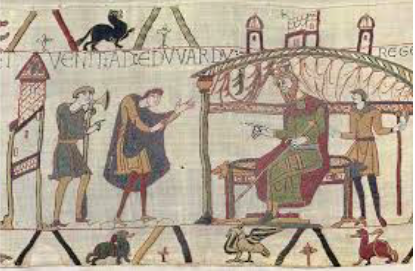
And later, that oath was rescinded, and Harold was crowned despite it. One can understand William’s anger. He did not pluck the notion that Edward had offered him the crown out of thin air, but to understand where this notion comes from, we must go back to 1051. In 1051, tensions between the king, his friend Robert de Jumièges and Godwin had reached boiling point. The king’s favourite was doing his best to undermine the king’s father-in-law, by reporting to the king with seditious tales of Godwin’s plotting to kill the king like he had killed the king’s brother, Alfred. It all kicked off by September when Edward’s brother-in-law was returning home to Boulogne from a visit. He and his retinue put on their mail coats before entering the town and caused trouble which erupted into a violent dispute in which a good number on both sides were killed. (It is very telling that the Frenchmen were said to have put on their coats of mail before they entered to the town. Were they expecting trouble?)
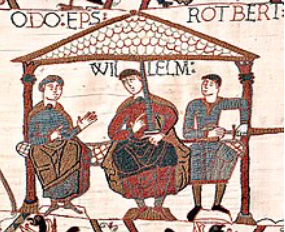
Edward ordered Godwin to punish the town, but Godwin, who had heard the side of the townfolk, refused. The Godwinsons were sent into exile and were gone for almost a year while between them, they gathered support in Ireland and St Omer in Flanders. During this time, it is thought that William visited Edward and ‘spoke about what they wanted to talk about, and when they were finished, he let him go again’. It was at this meeting, so the Norman chronicles say, that Edward promised his crown to William. Only one of the AS chronicles mentions this which is weird for a state visit where a discussion around succession supposedly took place. It is thought to be a late entry into the chronicle, written after the conquest. Despite this, I think it is possible it did happen, or if it wasn’t the duke himself who came, it might well have been his representative, maybe William FitzOsbern, his closest counsellor. It could have been any number of their mutual kin, perhaps, and there are a number of scenarios we can imagine. It could have had something to do with those French and Norman advisers Edward was so fond of, and Count Eustace of Boulogne may well have had a hand in the plot. Some say the duke was too tied up with troubles in Normandy to have come. But whatever the circumstance, William had the idea in his head, and it was to stay there for another 15 years or so. When the Godwins fought their way back home months later and were re-established in their lands and offices once more, some of Edward’s foreigners were exiled for treasonous counselling of the king, including Robert de Jumièges.Three years later when it was decided to send a mission to Europe to search for an heir with the blood of English kings, Edward’s promise to William seems to have been either pushed aside, swept under the rush mats, or forgotten like whispers in the wind. The focus was now to find the ‘atheling’ which eventually was to become the young Edgar. Edgar was given this title which meant ‘throneworthy’ – a title that was never bestowed upon William – ever. If Edward had meant to leave the throne of England to his younger cousin, why then did he allow the mission to find Edgar’s father, going to all the expense of sending an ambassadorial entourage to Europe. As an author and amateur historian, I have license to interpret history as I see fit, but I try to do so with as much integrity as I can and personally, this is what I feel may have happened:Edward’s plan to be rid of the Godwinsons had gone awry. He knew he had gotten himself into a predicament with William, whom he had only agreed to ‘consider’ as heir, knowing he had not right to do so without the agreement of the Witan. Having lost most of his Norman companions, Edward no longer had the support of his fellow compatriots. Robert had gone, and so had two of his bishops and a lot more. And with Robert had gone the Godwin boy hostages. Robert had taken them as he fled from Godwin’s wrath, for Godwin blamed him for his exiling. Edward knew his friend would be on his way to inform William that the hostages would be surety for Edward’s word. But the Norman plot had failed, and as time went on, any intentions of passing on his crown to William was off the agenda. He agreed with the witan that they must find his brother’s son, Edward, rumoured to be in Hungary, bring him back and make him atheling, but Edward the exile having died, his boy son Edgar took his place.
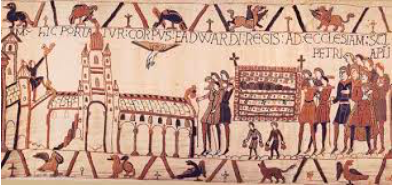
When 1065 came, no one in England, it seemed, imagined that Edward, even at his great age (he was around 61 at the time of his death) would die. He was still robust, well enough to go hunting that autumn with Harold, and showing no signs of illness. But when illness did come, it was not long before he was so ill, he could not even attend the consecration of his church. That Harold was already elected before Edward’s dying breath, I am sure. No doubt it was customary to have the deathbed decree as a rubber stamp. As I said before, England needed a king, and not a boy. Although the enterprise ended badly for the English, I still think the right man was chosen, and it ended as the gods wished it. Fate is inexorable, as they say, but not necessarily right.
Sons of the Wolf
By Paula Lofting
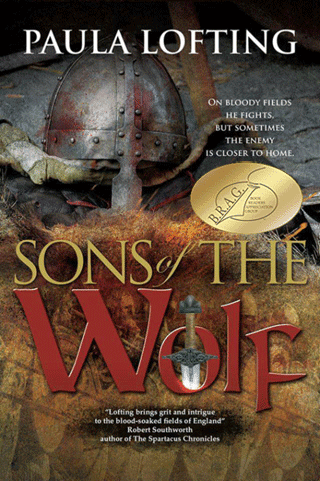
"Bloody. Brutal. Brilliant." - Mary Anne Yarde author of the Du Lac Chronicles founder of the Coffee Pot Book awards.
On the battlefield, Wulfhere fights for his life but elsewhere the enemy is closer to home, sinister and shadowy and far more dangerous than any war.
A forbidden love affair rekindles a dangerous ancient bloodfeud and when Lord Harold, Earl of Wessex, demands that Wulfhere, thegn of Horstede, wed his daughter to his sworn enemy, Wulfhere must find a way to save his daughter from a life of certain misery at the hands of the cruel and resentful Helghi without compromising his honour and loyalty to his lord, Harold.
A tale of Battles & Bloodfeud in the years leading up to the Norman Invasion.
"Paula Lofting has woven an excellent story around the sparse records of historical events that are available from the opening years of the second millennium."
Winner of Chill with a Book Award and BRAG Medallion Award.
It is 1054 and King Edward sits on the throne of England.
Pick up your copy of
Sons of Wolf
Amazon UK • Amazon US
The Wolf Banner:
Sons of the Wolf Book 2
By Paula Lofting
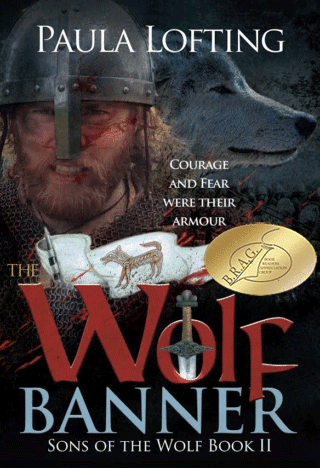
WAR AND BLOODFEUD
"Best battle description ever!"
1056...England lurches towards war as the rebellious Lord Alfgar plots against the indolent King Edward. Sussex thegn, Wulfhere, must defy both his lord, Harold Godwinson, and his bitter enemy, Helghi, to protect his beloved daughter.
As the shadow of war stretches across the land, a more personal battle rages at home, and when it follows him into battle, he knows he must keep his wits about him more than ever, and COURAGE AND FEAR MUST BECOME HIS ARMOUR…
Pick up your copy of
The Wolf Banner
Amazon UK • Amazon US
Paula Lofting
 Paula Lofting is the author of two published books in her series set in the Eleventh century:
Sons of the Wolf
, and
The Wolf Banner
. She is currently working on the third book, Wolf’s Bane. A psychiatric nurse by day, she writes in her spare time and also blogs at
1066: The Road to Hastings and Other Stories
.
Paula Lofting is the author of two published books in her series set in the Eleventh century:
Sons of the Wolf
, and
The Wolf Banner
. She is currently working on the third book, Wolf’s Bane. A psychiatric nurse by day, she writes in her spare time and also blogs at
1066: The Road to Hastings and Other Stories
.
Published on September 01, 2019 20:00
August 30, 2019
#BookReview — Thieves' Castle (The Tyburn Folios Book 2) by Dean Hamilton #HistoricalFiction #HistoricalThriller @Tyburn__Tree

Thieves' Castle(The Tyburn Folios Book 2)By Dean Hamilton
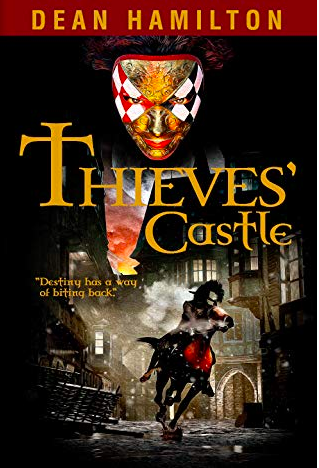
London 1576.
Kit Tyburn, ex-soldier turned play-actor and part-time intelligencer for the Queen’s spymaster Francis Walsingham, is back in London and adrift. Penniless, cut loose from both his playing troupe and his mercurial employer, Tyburn is hired to track down a missing gold-seller who has vanished, along with the monies needed for the completion of London’s first permanent theatre.
But London’s dark and fetid back-alleys hide deadly secrets, as Tyburn uncovers a more treacherous game – a war between two noble houses that pulls him into a murderous conflict on the streets, a deadly Spanish conspiracy and a twisted thief-lord chasing her vengeance.

“I know you have a talent for turning over rocks and setting everything under them running...”
Oh yes, Christopher Tyburn has a talent for making things run. That was why he worked part-time for spymaster Walsingham. In his other life, he is a play-actor for Worcester’s Men, but he has been away for too long, there is no place left for him on the stage.
James Burbage, however, might offer him employment, but not on the stage as Tyburn would prefer. Burbage is building a theatre, but his gold-seller has gone missing, along with Burbage’s money and papers. Without them, Burbage cannot build his theatre — his grand cathedral dedicated to the arts. If Tyburn can find the gold-seller along with the money, then that is worth at least 20 shillings.
However, as Tyburn begins to turn over the stones, he finds himself in the middle of a murderous war between two noble houses and tangled in the latest Spanish conspiracy. But, it is the vengeance of one woman that threatens to destroy them all.
From the capricious Channel wind to the seemingly lawless streets of Southwark, Thieves’ Castle (The Tyburn Folios #2) by Dean Hamilton is the highly anticipated sequel to the widely acclaimed The Jesuit Letter.
It has been a long wait for book #2 in The Tyburn Folios series, but it was certainly worth it. As rich and as vibrant in detail as any of Shakespeare’s plays, Thieves’ Castle has it all — warring houses, intrigues, violence, love, death, a spymaster, and a plot that will keep you up until late into the night while at the same time you sincerely hope that the story will never end. This is the kind of book that reminds me why Historical Fiction is my favourite genre.
I thought the characterisation of Christopher’ Kit’ Tyburn was wonderfully drawn. His story is tense, shamelessly compelling, and utterly captivating. I was not only thoroughly entertained by Hamilton’s depiction of Tyburn, but I was also wholly enchanted. Hamilton writes with imagination and a great sense of energy, which made this book absolutely irresistible from start to finish.
It is clear that Hamilton has painstakingly researched the era that this book is set in. He also seems to have an almost intimate knowledge of the people who lived during this time, and he writes seemingly effortlessly. Hamilton’s portrayal of James Burbage was simply divine, and it was exactly as I imagined him to be. All of the supporting characters, whether real or fictional, are given the same care and attention to detail as Tyburn, and although many come into the story and depart very quickly, we still get a sense of who they are and why they do what they did.
Hamilton's depiction of the backstreets of London and the theatre has to be commended. Hamilton spares no detail at the deprivation of areas such as Southwark. The depravity which seemed to run alongside the players and the theatre is immortalised in Hamilton’s crystalline prose and wonderful narrative.
Although this is the second book in the series, Thieves’ Castle stands very firmly on its own two feet and can be read comfortably as a standalone.
This novel is a real treat for lovers of Elizabethan historical fiction, but it would also appeal to those who like to read a tautly gripping historical thriller. Thieves’ Castle (The Tyburn Folios #2) will undoubtedly appeal to fans of Bernard Cornwell’s fabulous Fools and Mortals. I cannot wait to get my hands on book 3 of this not to be missed series.
I Highly Recommend.
Review by Mary Anne Yarde.The Coffee Pot Book Club.
Pick up your copy ofThieves' CastleAmazon UK • Amazon US
Dean Hamilton
 Dean Hamilton was born in Winnipeg, Manitoba, Canada. He spent the first half of his childhood chasing around the prairies and western Canada before relocating to Toronto, Ontario. He has three degrees (BA, MA & MBA), reads an unhealthy amount of history, works as a marketing professional by day and prowls the imaginary alleyways of the Elizabethan era in his off-hours. Much of his winter is spent hanging around hockey arenas and shouting at referees. He is married, with a son, a dog, and a small herd of cats.
Dean Hamilton was born in Winnipeg, Manitoba, Canada. He spent the first half of his childhood chasing around the prairies and western Canada before relocating to Toronto, Ontario. He has three degrees (BA, MA & MBA), reads an unhealthy amount of history, works as a marketing professional by day and prowls the imaginary alleyways of the Elizabethan era in his off-hours. Much of his winter is spent hanging around hockey arenas and shouting at referees. He is married, with a son, a dog, and a small herd of cats.He is the author of the gripping Elizabethan era thriller The Jesuit Letter. Thieves’ Castle is the second book in the Tyburn Folios series.
Connect with Dean: Website • Facebook • Twitter.
Published on August 30, 2019 21:00
#BookReview — The Confessor’s Wife by Kelly Evans #AngloSaxon #HistoricalFiction @ChaucerBabe

The Confessor’s WifeBy Kelly Evans

In the 11th Century, when barren wives are customarily cast aside, how does Edith of Wessex not only manage to stay married to King Edward the Confessor, but also become his closest advisor, promote her family to the highest offices in the land, AND help raise her brother to the throne? And why is her story only told in the footnotes of Edward’s history?
Not everyone approves of Edward’s choice of bride. Even the king’s mother, Emma of Normandy, detests her daughter-in-law and Edith is soon on the receiving end of her displeasure. Balancing her sense of family obligation with her duty to her husband, Edith must also prove herself to her detractors.
Edward’s and Edith’s relationship is respectful and caring, but when Edith’s enemies engineer her family’s fall from grace, the king is forced to send her away. She vows to do anything to protect her family’s interests if she returns, at any cost. Can Edith navigate the dangerous path fate has set her, while still remaining loyal to both her husband and her family?

“Sister, you’re to marry Edward, King of England...”
The news could not have been more surprising or unwanted. Edith of Wessex had been brought up by the nuns of Wilton Abbey, and she had no desire to leave her home and face the gauntlet of life at court. And the idea that she would be Queen of England seemed foolish, laughable almost — only it wasn’t. Edith was to marry Edward, and that was the end of it. However, for Edith, it was only the beginning.
Torn from a life of quiet contemplation, Edith finds herself in the very heart of the English court. It is here that Edith discovers an inner strength. A strength that she had not known she possessed, but if she is to survive the gossip-mongering, the curry of favours, and her mother-in-law, Edith must hold her head up high and become the Queen her country needs.
But there are those in court who fear Edith’s power and the rise of the House of Godwin. They will do anything to cast aspersions on her name and her family.
From the tranquillity of Wilton Abbey to the brutal slaying of the last Anglo-Saxon King of England, The Confessor’s Wife by Kelly Evans is the utterly enthralling story of Edith of Wessex’s life.
Meticulously researched, and with a masterful style which pulls you right into the story from the opening sentence, The Confessor’s Wife is a work of monumental scholarship. There is no doubt in my mind — this book is an absolute triumph.
In a time of treachery and war, the women of this era are often overlooked, and although much is known about the piety of Edward the Confessor and the turmoil that was left in his wake after his death, little is known about his wife, Edith. Evans has plucked Edith from obscurity and penned her story — and what a story it is. Filled with intrigue, treachery, scandal, love, and of course, God, The Confessor’s Wife is an example of historical fiction at its very best.
Evans tells Edith’s story with tremendous verse but also a keen sensitivity. Edith is highly accomplished and very intelligent, but she is also a very warm character, full of love for her husband. I thought Edith’s relationship with Edward came across as very plausible — history tells us that she did, after all, become one of Edward’s most trusted advisors. I thought their marriage was wonderfully portrayed and more importantly, believable.
As one would expect with a story about The Confessor, Edward spends a great deal of time away overseeing the building of Westminster Abbey, and while he does this, Edith runs her household with firmness but also fairness. Edith is the epitome of what a Queen should be.
Edith’s relationship with her brothers came across as slightly more complicated. As so often happens, the taste of power makes one crave more, and this is certainly how Evans has portrayed the House of Godwin. Edith is sometimes reckless as she makes sure her brothers advance — of course, the consequence is that other nobles see it as a consolidation of power and they fear where it will all end. I thought the rise of the House of Godwin — from earl to King — was beautifully depicted through the course of this novel.
Edith’s relationship with Tostig is very compelling. Tostig is a very likeable character, especially at the beginning of this story. He is very easy going with a great sense of humour and seemingly very compassionate, but there is a darker side to him. Tostig is very opinionated, and one might say narcissistic in his belief that he knows best — he will take no counsel from his sister. But Edith’s love for Tostig is unconditional, and she risks a great deal to save not only his life but also his reputation. Alas, she can not save Tostig from himself. Evans certainly has a wonderful eye for human frailty, and this especially applies to her portrayal of Tostig.
The desperately heroic struggle of Harold Godwin at the end of this book as he battles to retain his crown is profoundly moving, as is Edith’s grief when she learns that her brothers Tostig, Harold, Leofwine and Gyrth are dead and that the crown of England now belongs to that bastard Norman. But, when given the choice by William, Edith withdraws with honour. An ending that is befitting this worthy Queen of England.
Evans writes with a realism that was almost tangible and has presented her readers with a story that has an impressive sweep and brilliance. In a crowded bookcase, The Confessor’s Wife deserves the highest of acclaim.
I Highly Recommend.
Review by Mary Anne Yard.The Coffee Pot Book Club.
Pick up your copy ofThe Confessor’s WifeAmazon UK • Amazon US
Kelly Evans
 I’ve written for as long as I can remember, and was reading adult books in primary school. Love of stories just doesn’t cover it!Born in Canada of Scottish extraction, I graduated in History and English from McMaster University in Ontario, Canada. After graduation I moved to the UK where I worked in the financial sector. While in London I continued my studies in history, focussing on Medieval England and the Icelandic Sagas (with a smattering of Old Norse and Old English – tip: swearing in Old Norse is a really effective conversation stopper!).
I’ve written for as long as I can remember, and was reading adult books in primary school. Love of stories just doesn’t cover it!Born in Canada of Scottish extraction, I graduated in History and English from McMaster University in Ontario, Canada. After graduation I moved to the UK where I worked in the financial sector. While in London I continued my studies in history, focussing on Medieval England and the Icelandic Sagas (with a smattering of Old Norse and Old English – tip: swearing in Old Norse is a really effective conversation stopper!).I now live in Toronto, Canada with my husband Max and two rescue cats (Bear and Wolf). I worked in the financial sector as a trade technology project manager for over 20 years but retired recently to write full time. I’m a voracious reader (I brought over 3,000 books with me when I moved back to Canada from England) and enjoy history, music (I play medieval recorder), and watching really really bad horror and old sci-fi movies.
In my alternate identity as Lady Matilda, I post satirical articles on managing your medieval manor during the Black Death (Read them Here)
I’m currently working on my next novel, The Beggar Queen, set in Merovingian France.
Connect with Kelly: Website • Twitter • Facebook • Goodreads.
Published on August 30, 2019 20:00
August 29, 2019
#HistoricalFiction author, Brook Allen, is talking about finding your tribe. There is also a chance to check out Brook's fabulous book — Antonius: Son of Rome #AncientRome @1BrookAllen
Find your Tribe…By Brook Allen
Since returning from a phenomenal weekend at the Historical Novel Society's bi-annual conference, I wanted to blog on a particular subject that has become near and dear to my heart.
Find your tribe.
It doesn't matter what your occupation might be. It doesn't matter your interest. The importance of finding and mingling among like-minded people is tantamount to your advancement. In his book on life-empowerment, Alaric Hutchinson writes:
"On the road to success, there is always room to share appreciation and gratitude for other people’s successes."Living Peace: Essential Teachings for Enriching Life.
Perhaps it's different for other occupations, and I won't attempt to presume to know. But among writers, it is simply NECESSARY to have an open, honest camaraderie. We need people to read our work--preferably other writers. There are times when we may need a blurb or review to help us along, driving our work forward into the limelight. Upon other occasions, merely conversing, sharing, and crying on one another's shoulders is a healthy release amid the stress of deadlines, edits, and the process of publication.
 With my editor-extraordinaire, Jenny Quinlan who has given me the fire to finish my trilogy and begin future projects.
With my editor-extraordinaire, Jenny Quinlan who has given me the fire to finish my trilogy and begin future projects.The Historical Novel Society has introduced me to a wealth of people who are varying degrees of--ME! We share dreams, successes, and if there's a failure, we commiserate with one another. This week, I had several precious, memorable days with my other "selves," laughing, discussing our work, and celebrating craft. For me, I was able to revel in just BEING an author--accepting praise for my work, selling it, signing, it, and (hopefully) inspiring writers who haven't reached that point quite yet but are striving to do so.
 With key-note speaker and bestselling author, Jeff Shaara, who wrote the epic GODS AND GENERALS, which was eventually made into a movie..
With key-note speaker and bestselling author, Jeff Shaara, who wrote the epic GODS AND GENERALS, which was eventually made into a movie..This past March, shortly after the launch of Son of Rome, I beta-read a book for a friend who was in the process of seeking representation for her work. I found myself looking FORWARD to returning home from work to get back to her novel, and I was totally immersed in it. After finishing the read, I thought, "Wow. This really might be her ticket. She may win an agent with this one."
Well, this week she did. After receiving not one or two, but FIVE offers from highly respected agents, my friend Sarah made the choice that was the "right fit" for her. I was ECSTATIC! Somebody I KNEW, who had read MY WORK, was getting the chance of a lifetime. And I had grown enough myself to have RECOGNIZED the spark in her work that made it happen. And how did all this transpire for both me and for her?
Friends, we had found our tribe. Now, go out there and find YOURS.
Antonius:Son of RomeBy Brook Allen

For over two-thousand years, Marcus Antonius—Marc Antony—has been one of history’s most controversial men. His story was buried with him and written by his enemies. Now his entire saga is revealed in a compelling trilogy by Brook Allen.
After young Marcus Antonius’s father dies in disgrace, he yearns to restore his family’s honor during the final days of Rome’s dying Republic. Marcus is rugged, handsome, and owns abundant military talent, but upon entering manhood, he falls prey to the excesses of a violent society. His whoring, gambling, and drinking eventually reap dire consequences. Through a series of personal tragedies, Marcus must come into his own through blood, blades, and death. Once he finally earns a military commission, he faces an uphill battle to earn the respect and admiration of soldiers, proconsuls, and kings. Desperate to redeem his name and carve a legacy for himself, he refuses to let warring rebels, scheming politicians, or even an alluring young Egyptian princess
Excerpt
Marcus met the king’s eyes for the first time. Lined with thick kohl, they were puffy with insomnia or drink. A red-veined, hook nose jutted from his face, vulture-like. The man was downright unhealthy. Could he even make it to Pelusium? What a fine mess it would be if he up and died while returning to Egypt. Ptolemy smiled wistfully.
“To think I’ll be back in Alexandria with my sons.” Marcus saw tears in his eyes. “And I pray my little Lotus Flower is safe,” he continued, directing his words to Antipater. “I left so quickly under cover of night; I couldn’t see to her safety. If Berenice has harmed Lotus, her death will be tortuous misery.”
Abruptly, the Egyptian ruler rolled off his dining couch and padded out of the room, overcome by emotion.
Antipater leaned in toward the three Romans, offering an excuse for his guest’s sudden exit. “‘Lotus’ is his favorite child. Her real name is Cleopatra. He claims she speaks six or seven different languages—and is barely fourteen. What an extraordinary child she must be.”
Marcus barely listened. He was staring at the map, his fingers tracing the path from Jerusalem to Pelusium: the gateway of Egypt.
Pick up your copy ofAntonius: Son of RomeAmazon UK • Amazon US
Brook Allen
 Brook Allen is a Music Educator in a rural community near Roanoke, VA. Aside from her regular classes, she teaches two ensembles, a Chorus and Recorder Consort. Born in Salt Lake City, UT, Brook was raised in Omaha, Nebraska and has lived all over the U.S., from the Pacific Northwest, all the way down to Florida. She graduated with a B.A. in Music Education and has a M. A. in Liberal Studies, with an emphasis on Roman History. Brook is happily married and has two energetic Labrador Retrievers. Voraciously active, she cycles, hikes, and loves to travel.Connect with Brook: Website • Twitter • Facebook.
Brook Allen is a Music Educator in a rural community near Roanoke, VA. Aside from her regular classes, she teaches two ensembles, a Chorus and Recorder Consort. Born in Salt Lake City, UT, Brook was raised in Omaha, Nebraska and has lived all over the U.S., from the Pacific Northwest, all the way down to Florida. She graduated with a B.A. in Music Education and has a M. A. in Liberal Studies, with an emphasis on Roman History. Brook is happily married and has two energetic Labrador Retrievers. Voraciously active, she cycles, hikes, and loves to travel.Connect with Brook: Website • Twitter • Facebook.
Published on August 29, 2019 20:00
August 28, 2019
Historical Fiction author, Suzy Henderson, is taking a look at becoming acquainted with your character: Writing Historical Fiction #HistoricalFiction @Suzy_Henderson
Becoming acquainted with your character: Writing Historial FictionBy Suzy Henderson
People often ask why I write historical fiction, or in my case, stories set in World War Two. Usually, I explain how I've always been fascinated by the era, the premise of war, of people, caught up in extraordinary times, doing extraordinary things. But it goes deeper than that. When a notable person from the past crosses my path, I’m compelled to learn more.
Madame Fiocca focuses on a real person - Nancy Wake Fiocca, aka Nancy Forward, a woman caught in extraordinary times who went on to achieve so much for both the Allies and France, the country she had made her home. I was drawn to Nancy from the moment I first heard of her exploits. But how can you possibly get to know someone who passed away years ago, assuming you have no links to their families and friends?
When I first read about Nancy, I heard how she was a brave, fearless warrior of the Special Operations Executive who killed Germans with her bare hands and led thousands of men – Maquisard's – in battle against the Germans. That was Nancy Wake. Or so I thought. I'd seen interviews that she'd given over the years, listened to her speak, listened to her swear, analysed the tone and emotion in her voice, studied her facial expressions when asked questions. In her words, she was never afraid. She hated the Nazis. But the more I listened, the more I observed, the more I began to wonder, and doubt, and I wanted to know more.
Portrayed as the hard-drinking, direct-speaking, fearless, ruthless bad-ass fighter, and I thought, what was she like as a child? What happened in her life to shape the person she became? What about her parents and her family? What about her love life? My research included Genealogy sites, the National Archives, from where I was able to obtain copies of her service records, newspaper articles, old interviews, biographies, military and personal accounts. Newspaper interviews, and some of the biographies, including accounts from Nancy herself, contained inaccuracies and clouded the facts for a while. Nancy was an enigma, but gradually, piece by piece, the real picture began to form, and Nancy Wake Fiocca finally stepped into the light.
The human condition is a fascinating subject. We are all so individual, so unique. Like most of us, Nancy had many layers, all of them revealing a little more, shining a light on the real story, her story, of which she was undoubtedly the heroine. And it's one filled with tragedy, love, fun, and sadness. And above it all, she rose like a phoenix and went on to live until she was almost ninety-nine years old. And although she always told reporters she had no regrets, that wasn't the whole truth.
A few people have told me how they feel it's wrong to romanticise war. Well, I can see their point, but you see, life is multi-faceted, and love is part of the picture. There are war novels that don't focus on romance just as there are those that do. It is neither right nor wrong. It's life. There has always been romance, especially during wartime, for obvious reasons, and so why not write about it? Writers look at everything, warts and all. Love is love and war is war. It should be acknowledged that the generation who served in WW2 have often reminisced about their experiences of war and of love in wartime in the same breath.
People who sacrificed so much, people who suffered in the name of freedom, the freedom we are privileged to hold today, deserve to be talked about, to be remembered. I’m both grateful and deeply saddened for their sacrifice. Armed with our pens and imagination, writers keep flames burning, re-telling history through words, painting vivid stories which become eternal, the real characters immortalised, bound in beautiful books. And this is why I write historical fiction.
Madame Fiocca
By Suzy Henderson

Marseille, September 1939. War is coming.
Nancy Wake is a gregarious twenty-seven-year-old about to marry wealthy French industrialist, Henri Fiocca. When Henri is called to the Front to fight, Nancy, determined to help the war effort, travels to Paris to join the Red Cross as an ambulance driver. Every day she witnesses atrocities. When Paris falls, Nancy flees the German oppressors and returns home to Marseille.
France is a nation defeated; its people are in despair. As Nancy recalls the Germans who whipped Jews on the streets of Vienna a few years earlier, she vows to fight for what is right.
A chance encounter with a British officer draws Nancy into the heart of the Garrow escape network, despite Henri’s reservations. Armed with wealth and charm, she convinces Henri that the Germans will never suspect such a woman. But soon she finds herself caught up in a deadly game of espionage.
As the iron fist of the enemy tightens, neighbours denounce neighbours. No one can be trusted. When the enemy closes in, Nancy and Henri face an impossible choice. Has she done more harm than good?
Coming this November...
The Beauty Shop
By Suzy Henderson

England, 1942. After three years of WWII, Britain is showing the scars. But in this darkest of days, three lives intertwine, changing their destinies and those of many more.
Dr Archibald McIndoe, a New Zealand plastic surgeon with unorthodox methods, is on a mission to treat and rehabilitate badly burned airmen – their bodies and souls. With the camaraderie and support of the Guinea Pig Club, his boys battle to overcome disfigurement, pain, and prejudice to learn to live again.
John ‘Mac’ Mackenzie of the US Air Force is aware of the odds. He has one chance in five of surviving the war. Flying bombing missions through hell and back, he’s fighting more than the Luftwaffe. Fear and doubt stalk him on the ground and in the air, and he’s torn between his duty and his conscience.
Shy, decent and sensible Stella Charlton’s future seems certain until war breaks out. As a new recruit to the WAAF, she meets an American pilot on New Year’s Eve. After just one dance, she falls head over heels for the handsome airman. But when he survives a crash, she realises her own battle has just begun.
Based on a true story, "The Beauty Shop" is a moving tale of love, compassion, and determination against a backdrop of wartime tragedy.
Pick up your copy of
The Beauty Shop
Amazon
Suzy Henderson
 Suzy Henderson lives with her husband and two sons in Cumbria, England, on the edge of the Lake District, a beautiful and inspiring landscape of mountains, fells, and lakes. She never set out to be a writer, although she has always loved reading and experiencing the joy of being swept away to different times and places.
Suzy Henderson lives with her husband and two sons in Cumbria, England, on the edge of the Lake District, a beautiful and inspiring landscape of mountains, fells, and lakes. She never set out to be a writer, although she has always loved reading and experiencing the joy of being swept away to different times and places.In a previous life she was a Midwife but now works from home as a freelance writer and novelist. While researching her family history, Suzy became fascinated with both World War periods and developed an obsession with military and aviation history. Following the completion of her Open University Degree in English Literature and Creative Writing, she began to write and write until one day she had a novel.
Other interests include music, old movies, and photography – especially if WW2 aircraft are on the radar. Suzy writes contemporary and historical fiction and is a member of the Historical Novel
Society and the Alliance of Independent Authors. Herdebut novel, The Beauty Shop , has been awarded the B.R.A.G. Medallion.
You can discover more about Suzy here: Website • Blog • Goodreads• Facebook • Twitter.
Published on August 28, 2019 20:00
The Coffee Pot Book Club Book Cover of the Month for August is — Storytellers by Bjørn Larssen #HistoricalFiction @bjornlarssen
The Coffee Pot Book Club
Book Cover of the Month
Goes to...

Storytellers
By Bjørn Larssen

In March 1920 Icelandic days are short and cold, but the nights are long. For most, on those nights, funny, sad, and dramatic stories are told around the fire. But there is nothing dramatic about Gunnar, a hermit blacksmith who barely manages to make ends meet. He knows nobody will remember his existence – they already don’t. All he wants is peace, the company of his animals, and a steady supply of his medication. Sometimes he wonders what it would feel like to have a story of his own. He’s about to find out.
Sigurd – a man with a plan, a broken ankle, and shocking amounts of money – won’t talk about himself, but is happy to tell a story that just might get Gunnar killed. The blacksmith's other “friends” are just as eager to write him into stories of their own – from Brynhildur who wants to fix Gunnar, then marry him, his doctor who is on the precipice of calling for an intervention, The Conservative Women of Iceland who want to rehabilitate Gunnar’s “heathen ways” – even that wicked elf has plans for the blacksmith.
As his defenses begin to crumble, Gunnar decides that perhaps his life is due for a change – on his own terms. But can he avoid the endings others have in mind for him, and forge his own?
Pick up your copy of
Storytellers
Amazon UK • Amazon US
Bjørn Larssen
 Bjørn Larssen - writer, blacksmith, mathematician, graphic designer, model (not all at the same time) was made in Poland. He is mostly located in Amsterdam, the Netherlands, except for his heart which he lost in Iceland. Born in 1977, he self-published his first graphic novel at the age of seven in a limited edition of one. Since then his short stories and essays were published in Rita Baum Art Magazine, Writer Unboxed, Inaczej Magazine, Edurada.pl, Homiki.pl, and Holandia Expat Magazine. He is a member of Alliance of Independent Authors and Writer Unboxed.
Bjørn Larssen - writer, blacksmith, mathematician, graphic designer, model (not all at the same time) was made in Poland. He is mostly located in Amsterdam, the Netherlands, except for his heart which he lost in Iceland. Born in 1977, he self-published his first graphic novel at the age of seven in a limited edition of one. Since then his short stories and essays were published in Rita Baum Art Magazine, Writer Unboxed, Inaczej Magazine, Edurada.pl, Homiki.pl, and Holandia Expat Magazine. He is a member of Alliance of Independent Authors and Writer Unboxed.
Bjørn used to speak eight languages (currently down to two and a half). His hobbies include sitting by open fires, dressing like an extra from Vikings, installing operating systems, and dreaming about living in a log cabin in the north of Iceland, even though he hates being cold. He has only met an elf once. So far.
Connect with Bjørn: Website • Twitter • Goodreads.
Book Cover of the Month
Goes to...

Storytellers
By Bjørn Larssen

In March 1920 Icelandic days are short and cold, but the nights are long. For most, on those nights, funny, sad, and dramatic stories are told around the fire. But there is nothing dramatic about Gunnar, a hermit blacksmith who barely manages to make ends meet. He knows nobody will remember his existence – they already don’t. All he wants is peace, the company of his animals, and a steady supply of his medication. Sometimes he wonders what it would feel like to have a story of his own. He’s about to find out.
Sigurd – a man with a plan, a broken ankle, and shocking amounts of money – won’t talk about himself, but is happy to tell a story that just might get Gunnar killed. The blacksmith's other “friends” are just as eager to write him into stories of their own – from Brynhildur who wants to fix Gunnar, then marry him, his doctor who is on the precipice of calling for an intervention, The Conservative Women of Iceland who want to rehabilitate Gunnar’s “heathen ways” – even that wicked elf has plans for the blacksmith.
As his defenses begin to crumble, Gunnar decides that perhaps his life is due for a change – on his own terms. But can he avoid the endings others have in mind for him, and forge his own?
Pick up your copy of
Storytellers
Amazon UK • Amazon US
Bjørn Larssen
 Bjørn Larssen - writer, blacksmith, mathematician, graphic designer, model (not all at the same time) was made in Poland. He is mostly located in Amsterdam, the Netherlands, except for his heart which he lost in Iceland. Born in 1977, he self-published his first graphic novel at the age of seven in a limited edition of one. Since then his short stories and essays were published in Rita Baum Art Magazine, Writer Unboxed, Inaczej Magazine, Edurada.pl, Homiki.pl, and Holandia Expat Magazine. He is a member of Alliance of Independent Authors and Writer Unboxed.
Bjørn Larssen - writer, blacksmith, mathematician, graphic designer, model (not all at the same time) was made in Poland. He is mostly located in Amsterdam, the Netherlands, except for his heart which he lost in Iceland. Born in 1977, he self-published his first graphic novel at the age of seven in a limited edition of one. Since then his short stories and essays were published in Rita Baum Art Magazine, Writer Unboxed, Inaczej Magazine, Edurada.pl, Homiki.pl, and Holandia Expat Magazine. He is a member of Alliance of Independent Authors and Writer Unboxed.Bjørn used to speak eight languages (currently down to two and a half). His hobbies include sitting by open fires, dressing like an extra from Vikings, installing operating systems, and dreaming about living in a log cabin in the north of Iceland, even though he hates being cold. He has only met an elf once. So far.
Connect with Bjørn: Website • Twitter • Goodreads.
Published on August 28, 2019 00:21
August 27, 2019
#HistoricalFiction author, Christopher J T Lewis, is exploring the history of Bezoar, and Bezoarticke medicines #History @cjtlewis
Of Bezoar, and Bezoarticke
medicinesBy Christopher J T Lewis
In my novel ‘Galileo’s Revenge’, in his bid to solve the death of Duke Francesco Galileo studies the works of French barber-surgeon Ambroise
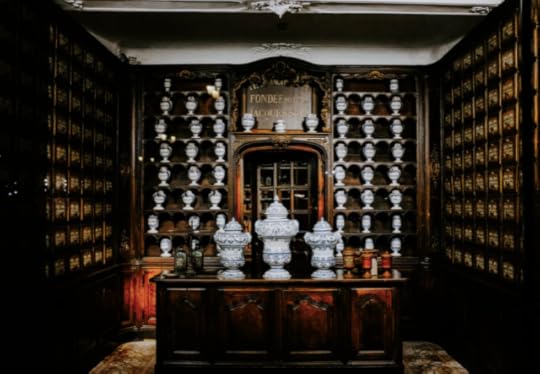 Apothecary shop, by Adrien Olichon on Unsplash.
Apothecary shop, by Adrien Olichon on Unsplash.On the name and nature of Bezoar
Let Paré explain:‘An Antidote or Counter-poyson is by the Arabians in their mother tongue termed “Bedezahar”, as “the preservers of life”. This word is unknowne to the Greekes and Latines, and in use openly with the Arabians and Persians, because the thing itselfe first came from them… In Persia and a certaine part of India is a certaine kinde of Goate called Pazain – the colour of this beast is commonly reddish, the height thereof indifferent – in whose stomack concreates the stone called Bezoar. It growes by little and little about a straw or some such like substance in scailes, like to the scailes of an onion. So that, when as the first scaile is taken off, the next appears more smooth and shining as you still take them away, the which amongst others is the sign of good Bezoar and not adulterate. This stone is found in sundry shapes, but commonly it resembles an Acorne or Date-stone. It is sometimes of a sanguine colour, and otherwhiles of a honey-like or yellowish colour, but most frequently of a blackish or dark greene, resembling the colour of mad Apples [aubergines], or else of a Civet Cat. This stone hath no heart nor kernel in the midst, but powder in the cavity thereof, which is also of the same faculty [i.e. efficacy].’
 By Jacob Spencer on Unsplash.
By Jacob Spencer on Unsplash.Paré’s etymology seems to be entirely correct. The Shorter Oxford Englsih Dictionary (OED) records ‘Bezoar…1477… adaptation of Persian pād-zahr counter-poison’. Anyhow, Bezoar turns out to be a calculus or concretion formed in the intestines of Persian goats. Hmm. But, at least, in contrast to Theriac and Mithridatium, it does not contain dozens of obscure and expensive ‘simples’ compounded in a secretive manner.
Preparation and Prescription: ‘By much exceeds what other Antidotes soever’
So, setting aside for the moment the sourcing of such an exotic object, how is Bezoar to be used, and what is it good for? ‘Now this stone is light, & not very hard, but such that it may easily be scraped, or rasped like alabaster, so that it will dissolve, being long macerated in water… They [the Persians] use it, induced thereto by our example, not onely against poysons, but also against the bites of venomous beasts…’ Furthermore, according to one authority, it may be used ‘with very good successe in inveterate melancholy diseases [such] as the itch, scab, tetters [eczema, herpes, etc.] & leprosie; therefore, by the same reason, it may well be given against a quartaine feaver.’ Bezoar powder, Paré continues, may also be recommended for ‘the bites of venomous animals’; also, if applied ‘to pestilent Carbuncles when they are opened, it drawes forth the venome’; and it is good for ‘the small pocks and meazles’. To sum up, some authorities believe ‘that this stone by much exceeds not only other simple medicines of this kind, but also such as are termed theriacalia, and what other Antidotes soever.’
Caveat emptor: Trade restrictions, authenticity and efficacy
It is not surprising, then, that the authorities in Persia should have taken steps to protect this valuable resource: ‘At first,’ explains Paré, ‘it was common amongst us [in Western Europe], and of no very great price, because our people who trafficked in Persia, bought it at an easie rate. But after that the faculties thereof were found out, it began to be counted more rare and deare, and it was prohibited by an Edict from the King of that country, that nobody should sell a Goate to the stranger Merchants, unlesse he first killed him’ – i.e. the Goate, I think – ‘and tooke forth the stone, & brought it to the King.’As a result of these restrictions – or was it all just clever marketing? – Bezoar stones became highly sought after, finding their way into elite ‘cabinets of curiosities’.
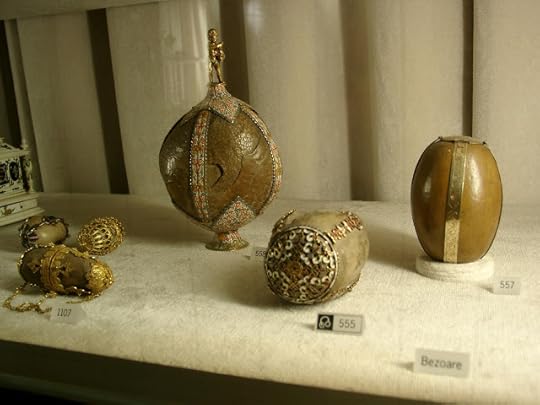 Mounted Bezoar stones in the treasure chamber of the Wittelsbach family, kings of Bavaria. By Schtone - Own work, Wikimedia.
Mounted Bezoar stones in the treasure chamber of the Wittelsbach family, kings of Bavaria. By Schtone - Own work, Wikimedia.Even without alleged obstacles to free trade, however, the temptation to counterfeit such a mundane and variable pebble must have been considerable. Paré is aware of the problem: ‘Of the notes by which this stone is tried [tested], (for there are many counterfeits brought hither,) the first is already declared’ – i.e. its onion-skin structure – ‘the other is, it may be blown up by the breath, like an oxes hide; for if the wind break through, and do not stay in the density thereof, it is accounted counterfeit.’ Hmm, again.Despite such caution in regard to authenticity, and despite his track-record of thoughtful scepticism, Paré shows little inclination to doubt the basic efficacyof a genuine Bezoar. At most, he doubted its universal efficacy. Thus:‘Some years agoe a certaine Gentleman, who had one of these stones which he brought out of Spaine, bragged before King Charles [IX of France (1560-74)]… of the most certaine efficacie of this stone against all manner of poysons. Then the King asked of me, whether there were any Antidote which was equally and in like manner prevalent against all poisons. I answered, that nature could not admit it, for neither have all poysons the like effects, neither doe they arise from one cause; for some worke from an occult and specific property of their whole nature, others from some elementary quality that is predominant’ and so on. That was the theory, at least. But anyhow, Paré suggested to the King, ‘it was an easie matter to make trial hereof …’
A trial of Bezoar
WARNING: there follows historical material some people might find distressing. I certainly do.Paré’s suggestion was to do an experiment ‘on such as were condemned to be hanged.’ (You might think that the test could more reasonably have been conducted on the ‘certaine Gentleman’ from Spain but, no matter.) ‘The motion [i.e. Paré ’s proposal] pleased the King.’ And so, forthwith, ‘There was a Cooke brought by the Jailor, who was to have been hanged within a while after for stealing two silver dishes out of his master’s house. Yet the King desired first to know of him, whether he would take the poison on this condition: that if the Antidote which was predicated to have singular power against all manner of poisons, which should be presently [i.e. immediately] given him after the poison, should free him from death, that then he should have his life saved. The Cook answered cheerfully, that he was willing to undergo the hazzard, yea, and greater matters, not only for to save his life, but to shun the infamy of the death he was like to be adjudged to.‘Therefore he then had poison given him by the Apothecarie that then waited [upon the King] and, presently after the poison, some of the Bezahar brought from Spain. Which being taken down, within a while after he began to vomit, and to void much stoole with grievous torments, and to cry out that his inward parts were burnt with fire. Wherefore, being thirsty, and desiring water, they gave it him. An hour after, with the good leave of the Jailor, I was admitted to him. I find him on the ground going like a beast upon hands and feet, with his tongue thrust forth of his mouth, his eyes fiery, vomiting, with store of cold sweats, and lastly the blood flowing forth by his ears, nose, mouth, fundament and yard. I gave him eight ounces of oile to drinke, but it did him no good, for it came too late. Wherefore at length he died with great torment and exclamation, the seventh hour from the time that he tooke the poison being scarcely passed.’
Post-mortem
Paré had first made his name as a military surgeon with the French army. Maybe his experience of treating the injured on the battlefield had inured him to suffering? Or maybe life was cheap and pain ubiquitous? Either way, like such other contemporary anatomists as Andreas Vesalius (1514-64), Paré was not about to miss the chance for an anatomical dissection:‘I opened the body in the presence of the Jailor and four others, and I found the bottom of his stomacke blacke and dry, as if it had beene burnt with a Cautery. Whereby I understood he had sublimate given him; whose force the Spanish Bezahar could not represse. Wherefore the King commanded to burne it.’Sublimate, also known as ‘corrosive sublimate’, is a chloride of mercury. In suitably dilute form it does have antiseptic and disinfectant properties. In any quantity, however, it is extremely poisonous. According to Paré in the immediately following chapter ‘Of Minerall Poysons’, ‘Such as have taken sublimate, their tongue and jawes become straightened and rough, as if they drunke the juice of unripe services… As soone as it descends to the stomack, it sticketh to it. Therefore presently after it frets and exulcerates; it causeth unquenchable thirst, and unexplicable torments… as if they were seared with an hot iron…’But let’s end on a lighter note. Fractionally. According to Emsley, at much the same time in Germany, another condemned criminal took the same gamble – and lived. He, however, had had the good sense, or good fortune, to put his trust in the medicinal clay known as terra sigillata.
Sources and ReadingParé, Ambroise. The works of that famous chirurgion Ambrose Parey translated out of Latine by Th. Johnson (London, 1634).Emsley, John. The Elements of Murder. A History of Poison (Oxford, 2005)
Galileo’s RevengeBy Christopher J T Lewis
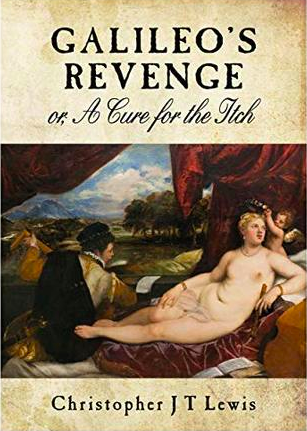
Florence, October 1587.
Francesco de’ Medici, the Grand Duke of Tuscany, collapses whilst out hunting with his ambitious younger brother, the Cardinal Ferdinand. Soon the Grand Duke is dead. Officially the Cardinal insists that his brother has died of a malarial fever. But secretly an investigation begins to find the killer – or a suitable scapegoat?
Galileo, a brilliant, impecunious, and unscrupulous young scientist, is struggling to make a name for himself at the corrupt court of the Medici. He is horrified to be arrested as the Duke’s murderer: nothing burns so well as a wicked magician! His only hope is to find the real killer – or, at least, a better scapegoat. His search takes him through the piazzas and palaces of Florence, through the barber-shops and brothels, the cloisters and the taverns. Especially the taverns.
Pick up you copy ofGalileo’s RevengeAmazon UK • Amazon US
Christopher J T Lewis
I am a historian and writer, living in Cambridge, UK. Galileo’s Revenge is my first work of fiction.
I have studied at Cambridge, London and Padua universities. Although theoretical physics was my first love, I subsequently became fascinated by the history of science. I am especially fond of the medieval and early modern periods: everything, that is, from the Venerable Bede (c.673-735) to the Honourable Boyle (1627-91), and a bit beyond.
A few years ago, I started work on a new, up-to-date biography of Galileo. Unfortunately (for me) a couple of other excellent scholars had already had the same idea, and I shelved my own project. But all was not lost. I have always loved crime fiction and historical fiction and above all historical crime fiction. (Yes, yes, I admit it: I adore Cadfael, even if he is the veritable white line down the middle of the road.) And so I had already started working on an early draft of my novel Galileo’s Revenge.
My story, fills in some of the large gaps in our knowledge about his early life, and entangles the young, ambitious Galileo with the real (and highly suspicious) deaths of the Medici Duke and Duchess of Tuscany in 1587. How hard can writing fiction be? I asked myself.You just make it up as you go along. And I won’t have to check my references. A much older and slightly wiser man, I finally stopped writing and published Galileo’s Revenge, or: A Cure for the Itch in November 2018.
I taught for the Open University for some fifteen years; for another twenty years I was a supervisor and Affiliated Research Scholar at the Department of History and Philosophy of Science in Cambridge. My previous work includes Heat and Thermodynamics. A historical perspective (Greenwood, 2007), a largely biographical and social treatment aimed at non-specialist students and the general reader. This received an award from the US journalChoice as one of their ‘Best Academic Books of the Year 2008’.
But I have put all that behind me now, and I am trying to go straight. I live quietly just off the Mill Road in Cambridge, in newly fashionable Romsey Town. This is most convenient for splendid café/vinyl store ‘Relevant Records’, for wonderful cocktails at ‘196’, and for tasty Italian delicatessen at ‘Limoncello’. It was at each of these excellent emporia, of course, that I had the original inspiration for Galileo’s Revenge. Oh alright, that’s not true, it was whilst walking along the promenade at Southwold, but they have all helped to keep me going along the way.
Connect with Christopher: Website • Twitter
Published on August 27, 2019 20:30
August 26, 2019
#HistoricalFiction author, J.R. Lindermuth, is talking about what inspired him to start writing. He is also sharing an excerpt of his fabulous book — The Bartered Body @jrlindermuth
An Author’s Inspiration
By J.R. Lindermuth
I believe writers are influenced by the places they live and the people they meet along the way.As writers, whether we love or loathe these places and people, they tend to show up in our work.I know it's true for me. Most of my published novels, non-fiction and short stories are set in places where I've lived. I grew up, and now live again, in Pennsylvania's anthracite coal region, right on the edge of what's known as the Pennsylvania Dutch country.

My environment is a mix of what some might term bleak and harsh (the area ravaged by centuries of coal mining and now depressed by lack of economic opportunity) and the more romantic Amish and non-Amish tourist destinations. In fact, there's beauty and despair to be found in both regions.The beauty can be found in both scenery and people, though it may be less obvious in the former setting.It's been said, the best part of history is story. My area is rife with history and stories illustrative of that history which have inspired me for most of my life.My paternal grandfather was a storyteller and, if genes have anything to do with it, launched me on the same path.Pop was a railroader forced into early retirement by a heart condition. As a boy, I spent much time in his company listening to his tales about his boyhood, railroading, miners, the Molly Maguires and other topics of interest.I was also an early reader and soon developed a desire to create stories of my own. I remember writing some stories before high school, but that's where it really got started. The draft (Vietnam era) interrupted college plans. The Army sent me to a military version of J-school and I eventually became editor of a division newspaper in South Korea. Paraphrasing Melville I might say the Army was my Harvard and Korea my Yale.
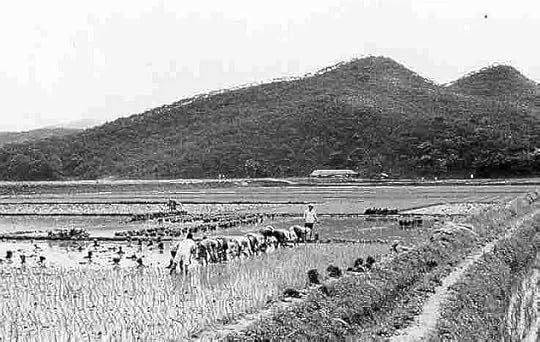
After military service, I remained in Korea for a time working as a copy editor for North Asia Press. Returning stateside, I worked first as a reporter on a small weekly, then on to several dailies covering most every beat and editing slot before finally retiring in 2000 from my hometown daily. Since retiring I continue to write a weekly local history column for the paper and serve as librarian for the county historical society where I assist patrons with genealogy and research. (Fort Augusta photo)I'd published short stories and articles throughout my newspaper career but my first novel didn't come until three years into retirement. As might be expected, it was based on local history.I've now published 20 novels and two regional histories. The novels are a mix of mysteries and historical fiction (including three westerns).My most recent novel is The Bartered Body, third in the Sheriff Tilghman mystery series set in a fictional coal region community in the 1890s.
The Bartered Body
By J.R. Lindermuth

Why would thieves steal the body of a dead woman?That’s the most challenging question yet to be faced by Sylvester Tilghman, the third of his family to serve as sheriff of Arahpot, Jordan County, Pennsylvania, in the waning days of the 19th century.And it’s not just any body but that of Mrs. Arbuckle, Nathan Zimmerman’s late mother-in-law. Zimmerman is burgess of Arahpot and Tilghman’s boss, which puts more than a little pressure on the sheriff to solve the crime in a hurry.Syl’s investigation is complicated by the arrival in town of a former flame who threatens his relationship with his sweetheart Lydia Longlow; clashes with his old enemy, former burgess McLean Ruppenthal; a string of armed robberies, and a record snowstorm that shuts down train traffic, cuts off telegraph service and freezes cattle in the fields.
Excerpt
Tuesday, February 7, 1899Chapter 1.
“She’s gone,” Virgil Follmer said.“What? Who?”Virgil’s head shot forward, his face going red as he rose up on the toes of his boots in an effort to appear taller than he actually is. “Dammit, Tilghman,” he bellowed, “open your ears. Don’t make me repeat myself. Time’s a-wastin’.”Virgil’s our town undertaker and generally the most docile, quiet man you’d ever want to meet. So, seeing him get this excited, I knew something terrible must have happened. “Calm down,” I told him. “I’m not a mind-reader. You’ll have to explain if you want my help. Now—who’s missing?’“Why Mrs. Arbuckle, of course. Somebody’s stole her body. Zimmerman’s gonna have a fit.”The late Mrs. Arbuckle was Nathan Zimmerman’s mother-in-law. Zimmerman is burgess of Arahpot, which makes him my boss. This news imposed a bit more urgency on my response. “I’ll get my hat and coat and be right with you,” I told Virgil. I’d just returned home and was heating up a pot of soup Doc Mariner’s wife had sent over when Follmer commenced pounding on my door.He waited impatiently by the door while I took the pot off the stove and got my garments. “If you’d subscribe for phone service a body wouldn’t have to go runnin’ half way across town to fetch you,” Virgil snarled.I’m the third of my family to hold the job of sheriff here in Arahpot, Jordan County, Pennsylvania, and I take my responsibilities seriously. But I have enough people yammering at me during the day at the office and prefer not to make it so convenient for them once I’m home for the evening. Of course I didn’t explain this to Virgil. Instead, as we strode down the hill toward town, I asked, “Didn’t you stop at the office? Cyrus should be there.”Virgil huffed. “If I’d wanted your deputy, I’da gone there. Thought this was important enough for your attention.”I couldn’t dispute his remark.Slush from the last snow made walking precarious and we had to concentrate on where we stepped to avoid slipping. It didn’t prevent Virgil from continuing to harp on the subject of the telephone.“I’m sure Miss Longlow would have seized the opportunity for the telephone contract if she’d known about it in time,” he said.I couldn’t argue the point. Lydia is one of the most astute business women I know and she certainly would have added the telephone to her various enterprises if McLean Ruppenthal hadn’t got the jump on her with prior knowledge—one of the benefits of being on the borough council, I suppose. He got the telephone franchise and has his sister Cora operating the switchboard. That makes him privy to many of the secrets in town—another advantage I’m certain he hasn’t overlooked.Still, this wasn’t the subject on my mind at the moment. “Never mind all that for now,” I said. “Why don’t you fill me in on what happened before we get to your place and I have to face Zimmerman.”Virgil gave me a look like a startled deer. “God, I haven’t told him yet. I wanted to talk to you first.”“Well, you haven’t told me a thing so far—other than that the old lady’s body is missing. How’d it happen?” I drew my collar closer round my neck against the damp chill of the evening, wishing I’d have thought to bring the nice warm scarf Lydia has knit for me.Follmer heaved a sigh and skipped his short legs in an effort to catch up to my longer pace. “I wish to heaven I knew how it happened. We had her all laid out nice in the coffin, set to deliver her for the viewing. Before goin’ out for supper I stepped in to make sure all was in readiness. The casket was empty. Syl, I know that old lady didn’t get up and walk out of my place on her own.”“That don’t make a bit of sense, Virgil. Why would someone steal a body?”“I don’t know. But they sure as heck did.” ‘I take it Floyd helped with the layin’ out,” I said, referring to Virgil’s assistant.“Course he did.”“Maybe he moved the body and you looked in the wrong coffin.”He peered at me as though my remark was the most idiotic he’d ever heard. “Why would he do that? I know which casket I put her in.”I shrugged. “Just a thought.”
Pick up your copy of
The Bartered Body
SUNBURY PRESS • Amazon
J. R. Lindermuth
 A retired newspaper editor, J. R. Lindermuth is the author of 20 novels and two regional histories. Since retiring, he has served as librarian of his county historical society where he assists patrons with genealogy and research. His short stories and articles have appeared in a variety of magazines. He is a member of International Thriller Writers and the Short Mystery Fiction Society, where he served a term as vice president. Connect with J. R. Lindermuth: Website • Facebook• Twitter • Goodreads• Amazon Author Page.
A retired newspaper editor, J. R. Lindermuth is the author of 20 novels and two regional histories. Since retiring, he has served as librarian of his county historical society where he assists patrons with genealogy and research. His short stories and articles have appeared in a variety of magazines. He is a member of International Thriller Writers and the Short Mystery Fiction Society, where he served a term as vice president. Connect with J. R. Lindermuth: Website • Facebook• Twitter • Goodreads• Amazon Author Page.
Published on August 26, 2019 20:00
The Coffee Pot Book Club
The Coffee Pot Book Club (formally Myths, Legends, Books, and Coffee Pots) was founded in 2015. Our goal was to create a platform that would help Historical Fiction, Historical Romance and Historical
The Coffee Pot Book Club (formally Myths, Legends, Books, and Coffee Pots) was founded in 2015. Our goal was to create a platform that would help Historical Fiction, Historical Romance and Historical Fantasy authors promote their books and find that sometimes elusive audience. The Coffee Pot Book Club soon became the place for readers to meet new authors (both traditionally published and independently) and discover their fabulous books.
...more
...more
- Mary Anne Yarde's profile
- 159 followers



